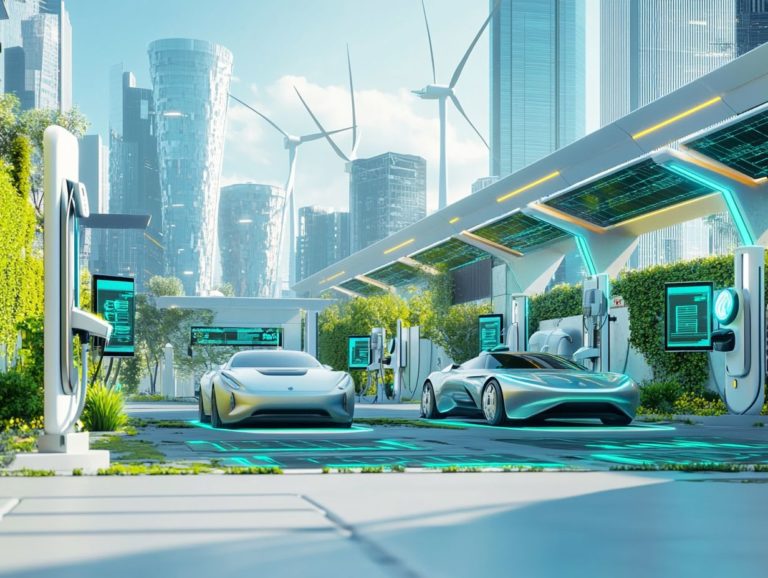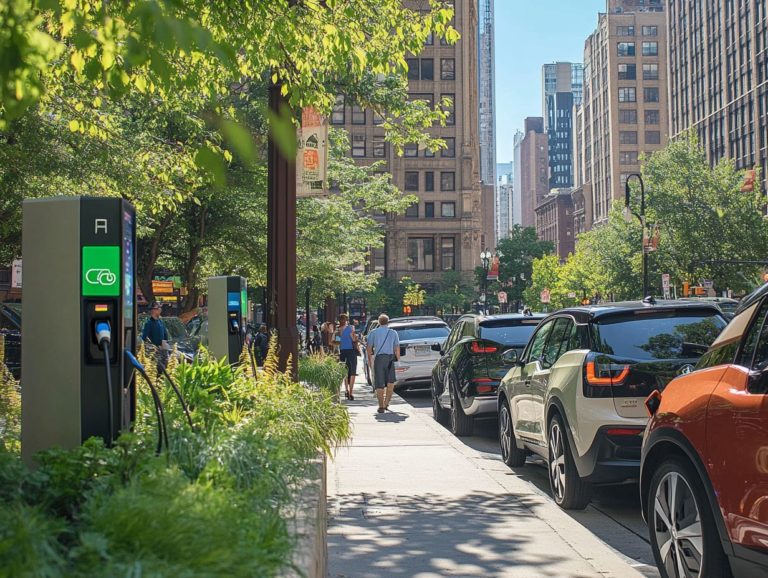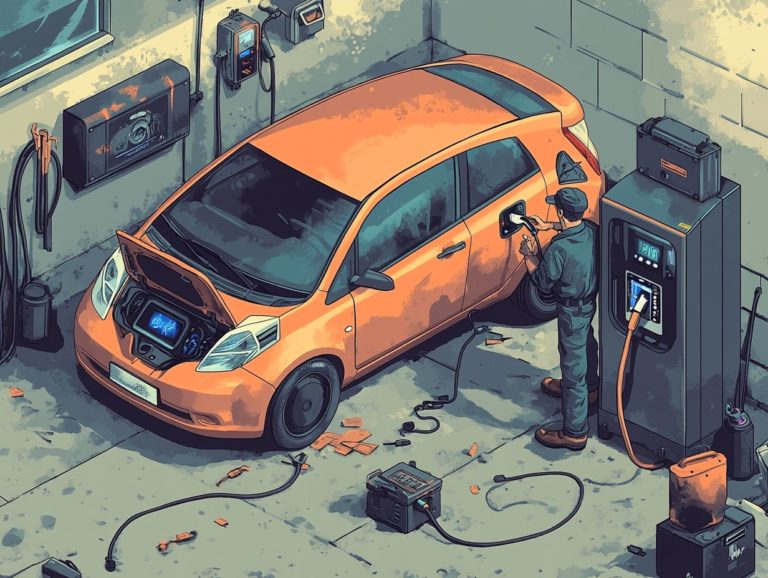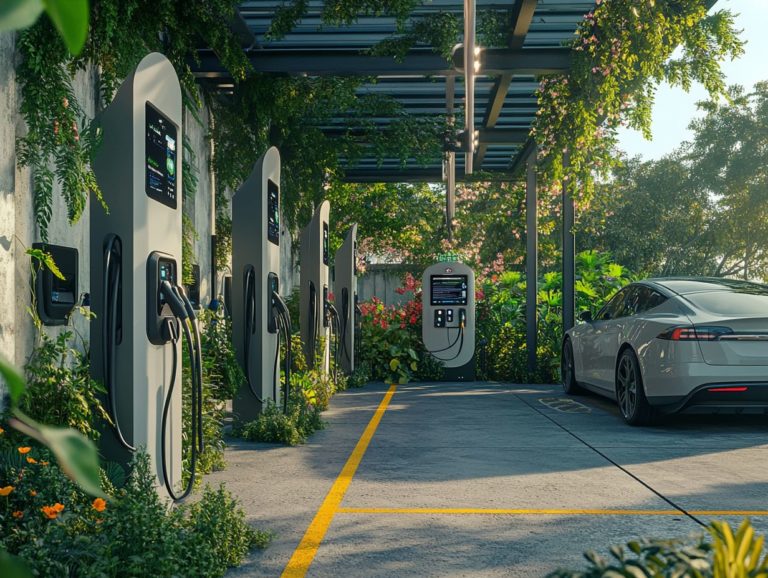understanding ev charging networks: a user’s guide
As electric vehicles (EVs) gain traction, understanding EV charging networks has become essential for you. These networks play a vital role in ensuring your electric car remains charged and ready, whether you’re at home, cruising down the highway, or parked in a public space.
This article delves into the various types of charging networks available, guiding you on how to access and utilize them seamlessly. You’ll discover the myriad benefits these networks offer, transforming your driving experience. It also highlights key factors to consider when selecting the right network for your needs and provides an insightful look into the future of EV charging. Get ready to supercharge your electric driving journey!
Contents
Key Takeaways:

- Understand the different types of EV charging networks – public, private, and residential – to determine which is most suitable for your needs.
- Accessing and using EV charging networks is becoming easier with advancements and expansion plans, offering environmental and cost savings.
- Consider factors such as location and network coverage before choosing an EV charging network, and stay updated on future advancements in this evolving industry.
What are EV Charging Networks?
EV charging networks are essential systems that enable you to recharge your electric vehicle (EV) efficiently and conveniently. Whether you’re a fully electric vehicle (EV) driver, a plug-in hybrid owner, or someone with a hybrid electric vehicle (HEV), these networks cater to your diverse needs.
They integrate various charging stations, both public and private, to ensure you have reliable access, actively supporting the growing EV infrastructure and promoting sustainable energy solutions.
As electric vehicles gain popularity, your demand for robust and accessible charging technology featuring options like DC fast charging and Level 2 chargers becomes increasingly vital. This enhances your experience and ensures smooth maintenance of your EV.
The variety of charging options available plays a crucial role in shaping your charging habits and influencing your decisions as a potential EV buyer. With advancements in charging speed, you can now locate stations that significantly reduce downtime, perfectly aligning with your busy lifestyle.
More importantly, the integration of smart charging technology allows you to navigate seamlessly, providing real-time information on station availability. This helps you plan your journeys more effectively and enhances your overall experience.
This added convenience builds your confidence in the viability of electric vehicles for daily commutes and long-distance travel. As these networks continue to evolve, they will pave the way for a more sustainable and accessible future for you and all EV users.
Types of EV Charging Networks
You ll find a range of EV charging networks tailored to the varied needs of electric vehicle users. These are primarily categorized into public charging stations, private charging solutions, and residential charging options.
Public charging networks are thoughtfully positioned in urban centers and along highways, ensuring that you have convenient access as you drive. On the other hand, private networks cater to businesses and organizations aiming to provide support for their employees and customers.
For those with electric vehicles, residential charging is essential, offering the convenience of charging right at home and significantly enhancing your overall EV charging experience.
Public, Private, and Residential Charging
Public, private, and residential charging represent the three primary categories of EV charging. Each is tailored to meet the distinct needs of various EV drivers.
Public charging stations are conveniently situated in accessible locations, offering fast charging stations for those on the move. Meanwhile, private charging options, often found at workplaces and commercial establishments, provide efficiency and convenience for employees and customers alike.
For homeowners, residential charging solutions enable overnight charging, a necessity for daily commuting and overall EV upkeep.
While public charging networks can greatly alleviate range anxiety with their fast charging stations, be aware that they may come with fluctuating costs and membership fees for you to navigate.
Private charging often involves membership requirements but can lead to lower operational costs in the long run, making it an appealing choice for businesses. Residential charging is generally the most economical option, allowing you to take advantage of off-peak electricity rates. However, it does require a dedicated home charging setup, which might pose a challenge for some.
Understanding these charging options is key for fostering a cohesive EV ecosystem that accommodates a wide range of driving habits and preferences.
How to Access and Use EV Charging Networks
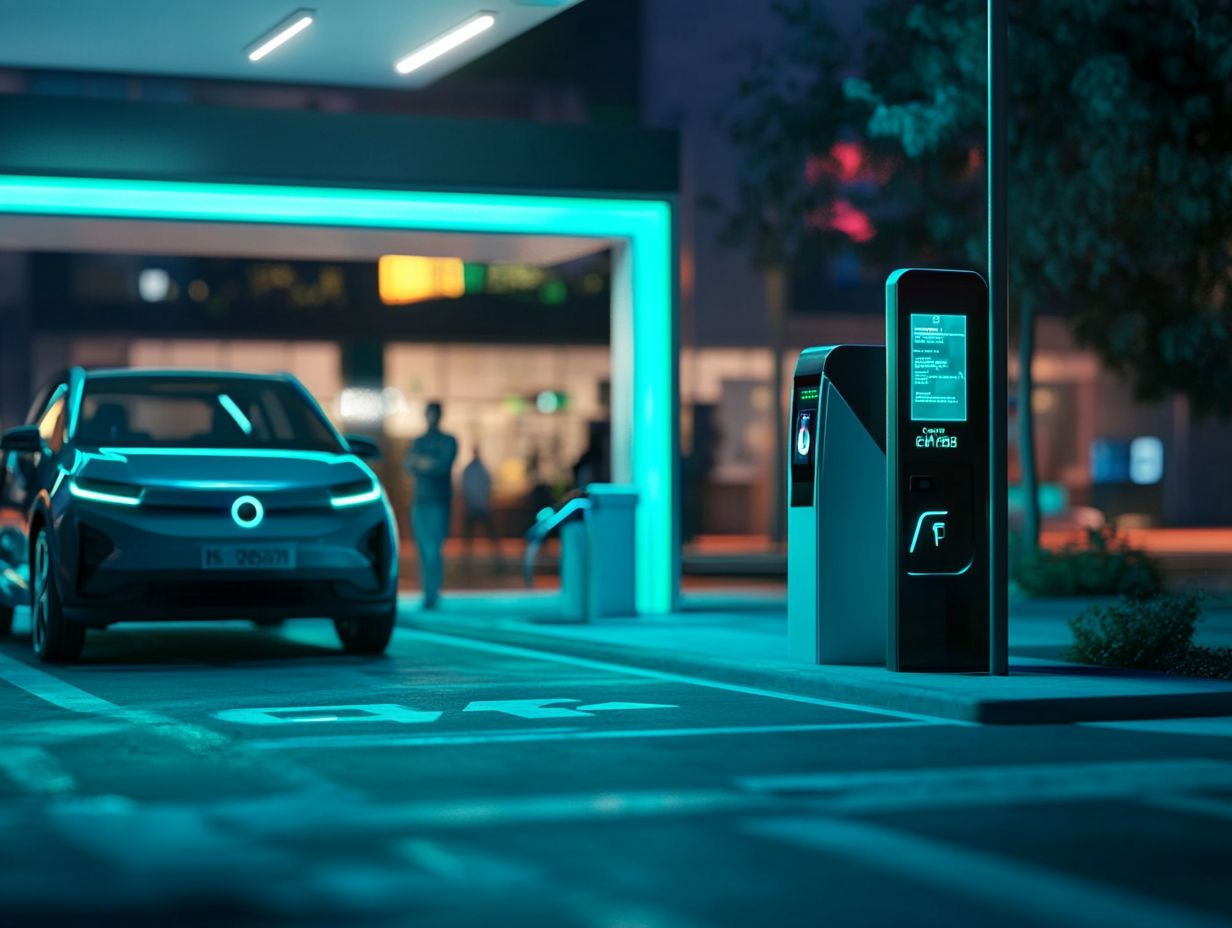
Accessing and utilizing EV charging networks efficiently requires a nuanced understanding of the entire charging process. Knowing how to find charging stations makes your journey smoother and more enjoyable!
This includes selecting the most suitable payment methods and being aware of the different charging speeds available for various electric vehicles.
Many EV drivers rely on mobile apps to pinpoint nearby charging stations, check their availability, and navigate through payment options, all of which contribute to a seamless experience.
By mastering the intricacies of the charging infrastructure, you can significantly enhance your EV ownership experience, minimizing both downtime and charging costs along the way.
Finding and Using Charging Stations
Finding and using charging stations is integral to your EV experience. This allows you to locate suitable charging options swiftly and efficiently.
Various mobile apps and websites deliver real-time insights into charging station availability, providing essential details about charging technology, such as Level 2 chargers a type of charger that provides a faster charge than a standard home outlet or DC fast charging options, to optimize your charging speed.
Accessing this information enhances your user experience, ensuring you can effectively manage your charging habits while on the road.
Use features like map integration and user reviews to find the best charging spots. Keep in mind that not all stations support the same charging adapters, which can lead to frustration if you’re not prepared.
Planning your charging stops in advance lets you anticipate charging duration, ensuring smoother journeys without unexpected delays. Understanding the nuances of charging speeds and compatibility significantly enhances the overall efficiency of your long trips, making technology an invaluable ally in your EV journey.
Benefits of Using EV Charging Networks
Using EV charging networks provides you with a multitude of advantages, from environmental benefits to substantial cost savings as an electric vehicle owner.
By tapping into renewable electricity sources for charging, you play a significant role in reducing greenhouse gas emissions and championing sustainable energy practices.
Public subsidies for charging infrastructure lower your overall charging expenses, making electric vehicles more accessible and encouraging broader adoption among the general public.
Don’t miss out on the best charging options plan ahead and charge smart!
Environmental and Cost Savings
The environmental benefits of EV charging networks enhance the appeal of electric vehicles. By using renewable electricity, you can significantly lower your carbon footprint and make a meaningful contribution to a greener planet.
The reduced charging costs compared to traditional fuel sources offer substantial savings over time, positioning electric vehicle ownership as not just an eco-friendly choice but also a prudent financial decision.
Beyond the immediate financial perks, choosing electric vehicles actively contributes to reducing pollution levels a critical concern for urban areas struggling with air quality issues. This reduction in pollutants leads to healthier communities and an improved quality of life.
As gasoline prices continue to escalate, the financial advantages of EVs become increasingly compelling. Government subsidies and incentives further alleviate the initial investment, making electric vehicles even more attainable.
Engaging with your community is essential in fostering awareness and facilitating the shift toward electric mobility, creating a collective impact that resonates well beyond your individual choice.
Considerations Before Choosing an EV Charging Network
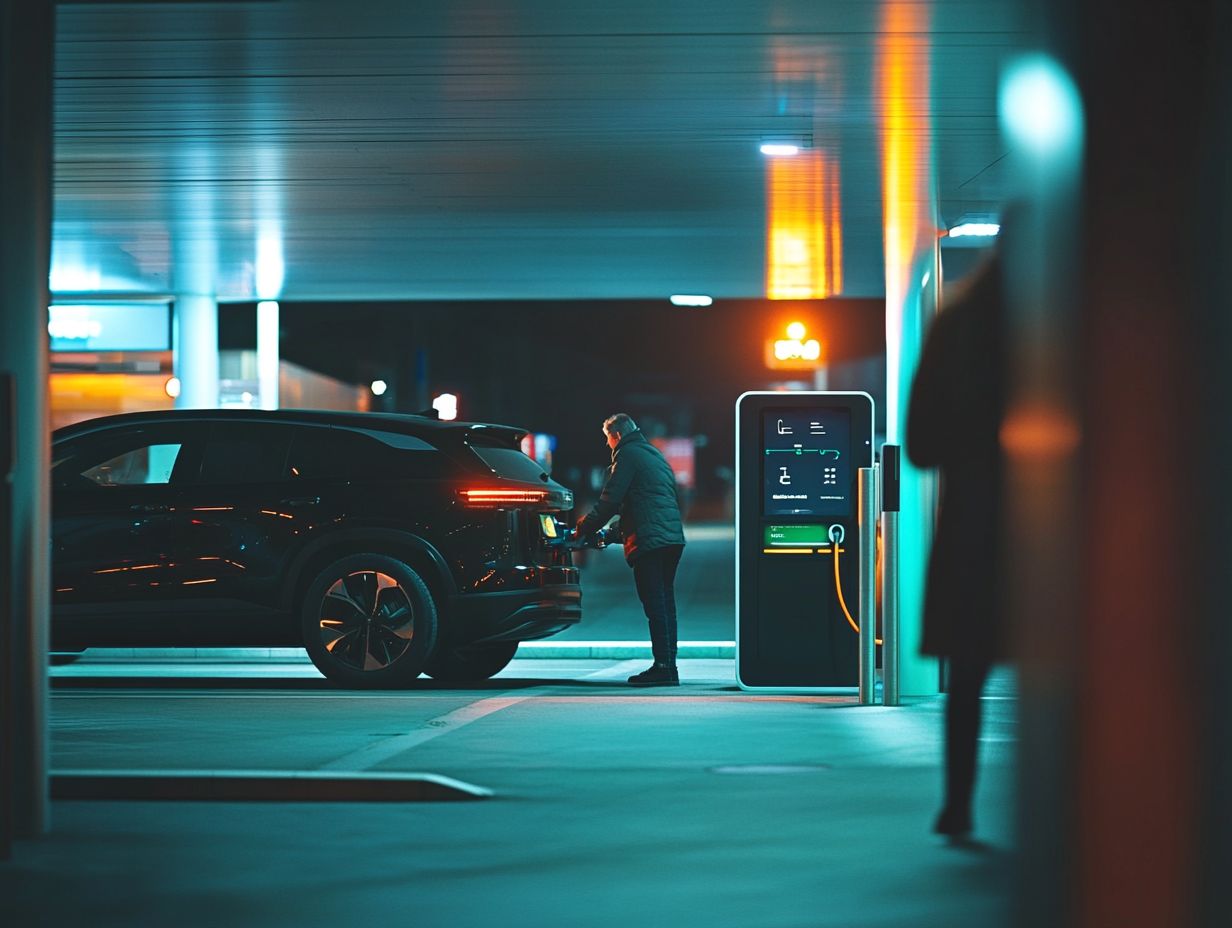
Before you choose an EV charging network, it s crucial to weigh several factors that cater to your unique needs and driving habits.
Consider membership requirements, the variety of charging options available, and the speed at which you can recharge. By diving into the nuances of different charging systems that provide power to charge electric vehicles, you can make informed decisions about which infrastructure will best suit your expectations and lifestyle.
Whether you re leaning toward rapid charging solutions or prefer a network boasting a plethora of charging stations, evaluating these elements is essential for a rewarding EV ownership experience.
Factors to Consider for Your Needs
When you evaluate EV charging networks, several key factors can profoundly shape your experience and satisfaction as an electric vehicle driver.
One critical aspect to consider is the coverage of charging stations, as this directly influences your accessibility and convenience for everyday use. The speed at which you can recharge your vehicle can also dictate how swiftly you can get back on the road, ultimately affecting your daily routines and long-distance travel plans.
Your experiences with a network can vary significantly; elements such as station reliability, customer service responsiveness, and ease of locating charging spots can make a substantial difference.
Consider the types of payment methods accepted. Networks that offer a variety of options can greatly enhance the convenience of your charging process.
Understanding the different charging models like pay-per-use versus subscription services can also impact your habits, encouraging you to select a network that best aligns with your lifestyle and travel patterns.
Future of EV Charging Networks
The future of EV charging networks is bright and full of exciting advancements, characterized by remarkable innovations in charging technology and ambitious expansion plans designed to meet your increasing demand for electric vehicles.
You can expect systems that not only enhance charging speeds but also elevate your overall user experience, making it easier than ever to find charging stations in various locations.
As the electric vehicle market continues to evolve, the growth of charging infrastructure will be crucial in facilitating widespread EV adoption. Join the movement towards a greener future with electric vehicles, ultimately ensuring a sustainable transportation future for everyone.
Advancements and Expansion Plans
Recent advancements and strategic expansion plans within EV charging networks are poised to redefine the landscape of electric vehicle support, enhancing your experience and ease of use.
The integration of next-gen charging technology will facilitate faster charging times and improve the accessibility of charging stations. By deploying infrastructure that leverages renewable electricity sources, these advancements help the environment and support the anticipated growth in the electric vehicle market.
Charging network providers are investing in ultra-fast chargers and smart technology. You’ll see significant improvements in energy distribution efficiency, minimizing downtime and enhancing your convenience. This progress opens the door for collaborations with both public and private sectors, paving the way for innovative partnerships that can extend the reach of charging stations to underserved areas.
By strategically aligning with city planners and utility companies, these providers can create a more interconnected charging ecosystem. This effort ultimately drives wider adoption of electric vehicles, promoting greener urban transportation solutions that benefit everyone.
Frequently Asked Questions
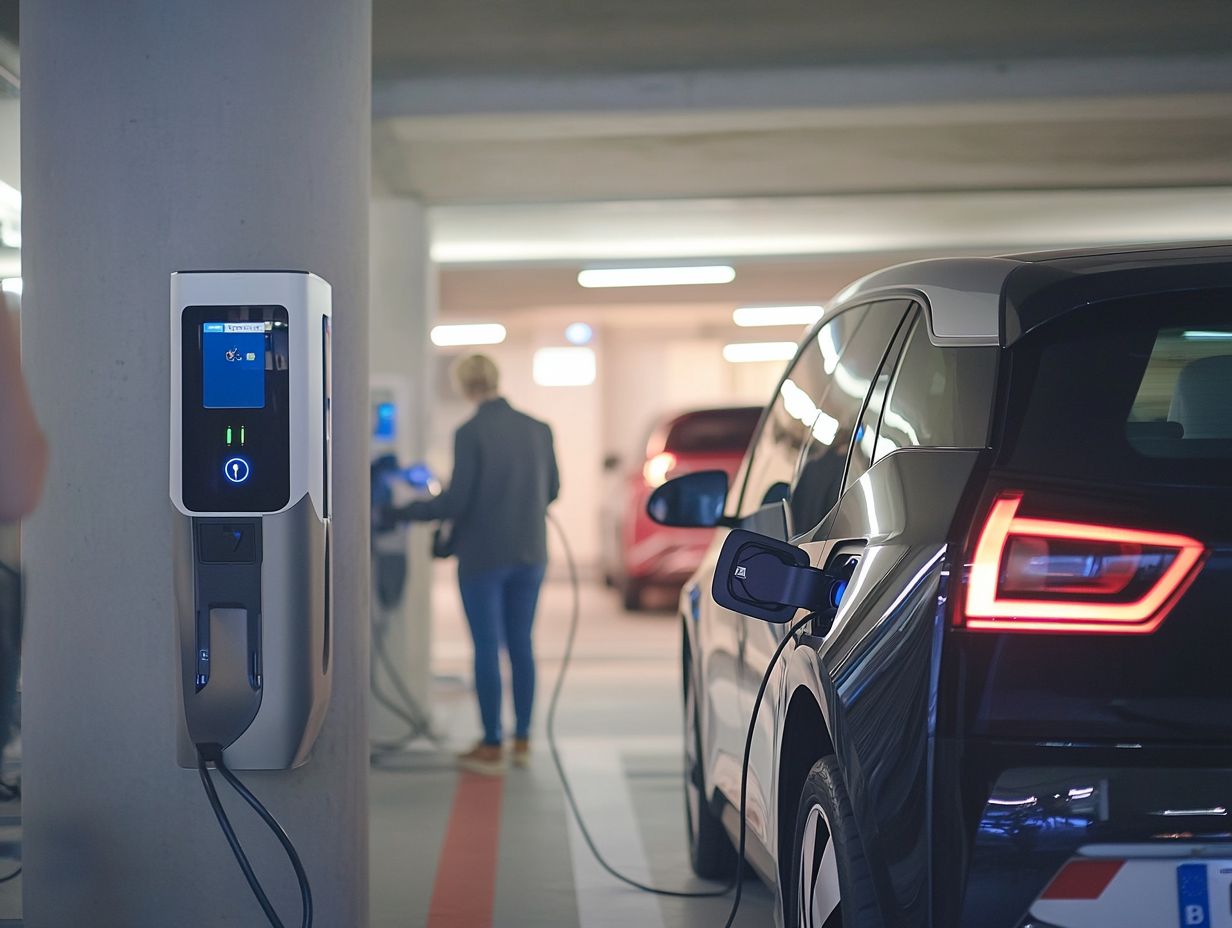
What is meant by EV charging networks?
EV charging networks are groups of electric vehicle charging stations connected to a central system, allowing users to easily locate, access charging stations, track usage, and make payments through a single platform.
Why is it important to understand EV charging networks?
Understanding EV charging networks is essential for electric vehicle owners to charge their vehicles efficiently. For a deeper insight, refer to understanding EV charging stations: a complete guide, which helps reduce range anxiety and promotes the adoption of electric vehicles.
How do I find charging stations on an EV charging network?
Most EV charging networks have mobile apps or websites that allow users to search for charging stations based on location. They also provide real-time information on availability and pricing.
Can I use any EV charging station on a network?
Not necessarily. Some EV charging networks require users to have a membership or a specific payment method to access their charging stations. It’s important to check the network’s policies before using a station.
What are the different types of EV charging networks?
There are three main types of EV charging networks: private, public, and workplace. Private networks are owned by specific companies, public networks are open to all users, and workplace networks are usually installed for employees to charge their vehicles at work.
Do I need to pay to use an EV charging network?
Yes, most EV charging networks require users to pay for the electricity they consume. Costs may vary depending on the network and the type of charging station used. Some networks offer membership plans with discounted rates for frequent users.
Join the electric revolution today!

